
In medicine, triage is a practice invoked when acute care cannot be provided for lack of resources. The process rations care towards those who are most in need of immediate care, and who benefit most from it. More generally it refers to prioritisation of medical care as a whole. In its acute form it is most often required on the battlefield, during a pandemic, or at peacetime when an accident results in a mass casualty which swamps nearby healthcare facilities' capacity.
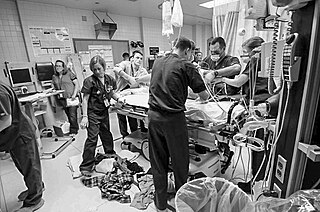
Emergency medicine is the medical speciality concerned with the care of illnesses or injuries requiring immediate medical attention. Emergency physicians continuously learn to care for unscheduled and undifferentiated patients of all ages. As first-line providers, in coordination with Emergency Medical Services, they are primarily responsible for initiating resuscitation and stabilization and performing the initial investigations and interventions necessary to diagnose and treat illnesses or injuries in the acute phase. Emergency physicians generally practise in hospital emergency departments, pre-hospital settings via emergency medical services, and intensive care units. Still, they may also work in primary care settings such as urgent care clinics.
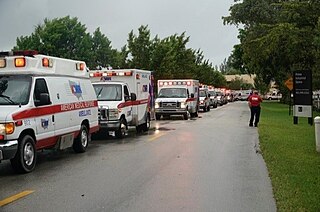
Emergency medical services (EMS), also known as ambulance services or paramedic services, are emergency services that provide urgent pre-hospital treatment and stabilisation for serious illness and injuries and transport to definitive care. They may also be known as a first aid squad, FAST squad, emergency squad, ambulance squad, ambulance corps, life squad or by other initialisms such as EMAS or EMARS.
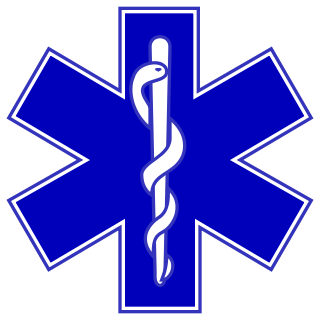
An emergency medical technician (EMT), also known as an ambulance technician, is a health professional that provides emergency medical services. EMTs are most commonly found working in ambulances. In English-speaking countries, paramedics are a separate profession that has additional educational requirements, qualifications, and scope of practice.

An emergency department (ED), also known as an accident and emergency department (A&E), emergency room (ER), emergency ward (EW) or casualty department, is a medical treatment facility specializing in emergency medicine, the acute care of patients who present without prior appointment; either by their own means or by that of an ambulance. The emergency department is usually found in a hospital or other primary care center.

Health care or healthcare is the improvement of health via the prevention, diagnosis, treatment, amelioration or cure of disease, illness, injury, and other physical and mental impairments in people. Health care is delivered by health professionals and allied health fields. Medicine, dentistry, pharmacy, midwifery, nursing, optometry, audiology, psychology, occupational therapy, physical therapy, athletic training, and other health professions all constitute health care. It includes work done in providing primary care, secondary care, and tertiary care, as well as in public health.

A certified first responder is a person who has completed a course and received certification in providing pre-hospital care for medical emergencies. Certified individuals should have received much more instruction than someone who is trained in basic first aid and cardiopulmonary resuscitation (CPR) but they are not necessarily a substitute for more advanced emergency medical care rendered by emergency medical technicians (EMTs) and paramedics. First responders typically provide advanced first aid level care, CPR, and automated external defibrillator (AED) usage. The term "certified first responder" is not to be confused with "first responder", which is a generic term referring to the first medically trained responder to arrive on scene and medically trained telecommunication operators who provide pre-arrival medical instructions as trained Emergency Medical Dispatchers (EMD). Many police officers and firefighters are required to receive training as certified first responders. Advanced medical care is typically provided by EMS, although some police officers and firefighters also train to become emergency medical technicians or paramedics.
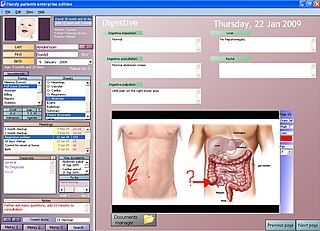
An electronic health record (EHR) is the systematized collection of patient and population electronically stored health information in a digital format. These records can be shared across different health care settings. Records are shared through network-connected, enterprise-wide information systems or other information networks and exchanges. EHRs may include a range of data, including demographics, medical history, medication and allergies, immunization status, laboratory test results, radiology images, vital signs, personal statistics like age and weight, and billing information.
An Urgent Care center (UCC), also known as an urgent treatment centre in the United Kingdom, is a type of walk-in clinic focused on the delivery of urgent ambulatory care in a dedicated medical facility outside of a traditional emergency department (ED) located within a hospital. Urgent care centers primarily treat injuries or illnesses requiring immediate care but not serious enough to require an ED visit.

The University of North Texas Health Science Center is a public academic health science center in Fort Worth, Texas. It is part of the University of North Texas System and was founded in 1970 as the Texas College of Osteopathic Medicine. UNT Health Science Center consists of five graduate schools with a total enrollment of 2,329 students (2020–21).
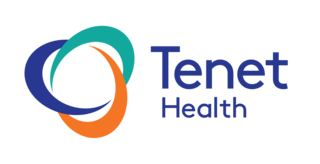
Tenet Healthcare Corporation is a for-profit multinational healthcare services company based in Dallas, Texas, United States. Through its brands, subsidiaries, joint ventures, and partnerships, including United Surgical Partners International (USPI), the company operates 65 hospitals and over 450 healthcare facilities. Tenet also operates Conifer Health Solutions, which provides healthcare support services to health systems and other clients.

Universal Health Services, Inc. (UHS) is an American Fortune 500 company that provides hospital and healthcare services, based in King of Prussia, Pennsylvania. In 2021, its annual revenues were $12.6 billion.
Texas Health Resources is one of the largest faith-based, nonprofit health systems in the United States and the largest in North Texas in terms of inpatients and outpatients served. The health system includes Texas Health Physicians Group and hospitals under the banners of Texas Health Presbyterian, Texas Health Arlington Memorial, Texas Health Harris Methodist and Texas Health Huguley. Texas Health has affiliated with numerous organizations — from all aspects of the health care industry — to better serve the more than 7 million residents of North Texas. These relationships, along with other major initiatives and quality programs, are supported by Texas Health's more than 350 points of access, 24,000 employees and 6,000 physicians with active staff privileges, with the collective aim to provide employers and consumers in North Texas with more affordable, high-quality and better-coordinated care. Their vision is "partnering with you for a lifetime of health and well-being."
John Peter Smith Hospital is a Level 1 Trauma Center, 573-bed county hospital located in Fort Worth, Texas that provides inpatient, outpatient and behavioral healthcare.

Adventist HealthCare is a not-for-profit health services organization based in Gaithersburg, Maryland that employs more than 6,000 people and provides healthcare for more than 400,000 individuals in the community each year. The primary service area for Adventist HealthCare is the Washington, D.C. metropolitan area. Despite similar names, it is not a part of the California-based Adventist Health, or Florida-based AdventHealth.
A medical scribe is an allied health paraprofessional who specializes in charting physician-patient encounters in real time, such as during medical examinations. They also locate information and patients for physicians and complete forms needed for patient care. Depending on which area of practice the scribe works in, the position may also be called clinical scribe, ER scribe or ED scribe, or just scribe. A scribe is trained in health information management and the use of health information technology to support it. A scribe can work on-site or remotely from a HIPAA-secure facility. Medical scribes who work at an off-site location are known as virtual medical scribes.
ScribeAmerica is a provider of medical scribes to hospitals and medical practices. Co-founders Michael Murphy and Luis Moreno met in 2002 and founded ScribeAmerica the following year in Lancaster, California. ScribeAmerica was headquartered in Aventura, Florida but recently moved its main offices to a larger facility in Fort Lauderdale, Florida.
QHR Technologies Inc. (QHR) is a Canadian healthcare technology company, founded in 2000. It represents 20 percent of the country's medical record market and its Medeo and AccuroEMR products are used by about 16,400 health professionals.
Cook Children's Medical Center is a not-for-profit pediatric hospital located in Fort Worth, Texas. One of the largest freestanding pediatric medical centers in the U.S., Cook Children's main campus is located in Tarrant County. The hospital provides comprehensive pediatric specialties and subspecialties to infants, children, teens, and young adults aged 0–21 throughout the Dallas-Fort Worth metro and the greater region. Cook Children's also has an ACS verified level II pediatric trauma center. The hospital has a rooftop helipad for the critical transport of pediatric patients to and from the hospital.
Federal and state governments, insurance companies and other large medical institutions are heavily promoting the adoption of electronic health records. The US Congress included a formula of both incentives and penalties for EMR/EHR adoption versus continued use of paper records as part of the Health Information Technology for Economic and Clinical Health (HITECH) Act, enacted as part of the, American Recovery and Reinvestment Act of 2009.











